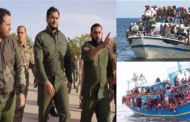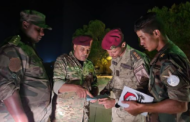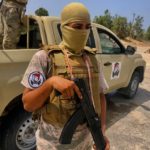Jul. 27, Al-Kaniyat militia leader Mohamed Al-Kani killed south of Benghazi during arrest attempt.
Jul. 28, Education Ministry shuts down all schools, universities until Aug. 15 amidst novel COVID-19 upsurge.
49-year-old Saif al-Islam Gaddafi resurfaces in rare NYT interview, hints at presidential ambitions.
TRIPOLI
- Aug. 1, the Director of the Office of Local Government Affairs and Elections in the Presidential Council, Abdel Basset Godan, confirmed that the Presidential Council is keen to hold the presidential elections on time. This came during his meeting with the Head of the Libyan High National Elections Commission (HNEC), Dr. Imad Al-Sayeh at HNEC’s headquarters in Tripoli;

- Jul. 31, an armed group arrested the Libyan journalist Ahmed Al-Senussi after he appeared in a live broadcast on his Facebook account in front of the Central Bank in Tripoli. In this broadcast he called upon his followers to postpone the demonstration without giving reasons. Some believe that Al-Senussi postponed the date of the protest due to the absence of demonstrators, as he appeared alone in the live broadcast. An hour after his broadcast, Al-Senussi wrote a short Facebook post stating that he was being held by the security forces protecting the Central Bank of Libya. Two hours later, Al-Senussi posted, “I am with Mr. Lotfi Al-Ahrari, and we are discussing some matters.”;

- Libya’s Ministry of Interior announced that the Investigation Unit of the Tripoli Law Enforcement Administration Branch of the General Administration of Security Operations, has arrested a six-member gang involved in kidnapping and ransom. According to the Ministry’s statement, the gang is headed by an Egyptian national and would kidnap expatriate workers, with the participation of Libyans in the areas of Janzour and Qara Buli. They would then demand a ransom from their victim’s families, in order to secure their release.
AIN ZARA
- Several members of the Municipal Council of Ain Zara were reportedly kidnapped by the Tripoli Revolutionaries Brigade, headed by Ayoub Aburas, sources said Jul. 27. The sources added that the militia stormed the municipality headquarters and assaulted the council members, and then reportedly took them to an unknown location. The kidnapped members were identified as, Abdel-Baset Al-Muradi, Mohamed Al-Marghani, Khaled Al-Ferjani, and Abdul-Muttalib Ghamak. No official statements have been released by the state authorities regarding the incident. Notably, Aburas had previously kidnapped several prominent officials, including Mohamed Baio, the former head of the Libyan Media Corporation.
BANI WALID
- Jul. 27, armed assailants attacked a prison in the Libyan town of Bani Walid, resulting in the escape of several inmates, according to the AAC news agency. Militants reportedly carried out the assault at night, where they captured the security staff, and managed to steal a vehicle.
BENGHAZI
- Jul. 27, Mohamed Al-Kani, Commander of the former 7th Brigade (later 9th Brigade), was killed south of Benghazi, during an operation to arrest and interrogate him. Military sources confirmed that a detachment of the armed forces raided the Al-Kani residence to arrest him. The sources denied that the operation or its circumstances was an assassination attempt, but confirmed that he had resisted and was killed in the ensuing fighting. A third person mentioned in the investigations was arrested;

- Jul. 27, the Speaker of the Libyan Parliament Ageela Saleh warned of the possible chaos of 2011 returning, should the December general elections be delayed. In press statements to Reuters, Saleh added that he did not want to see further divisions, “If the elections are delayed, we will go back to square one,” warning that a new, parallel government could emerge in the east.
COVID-19
- Jul. 28, the Ministry of Education of Libya’s Government of National Unity (GNU) has decided to suspend all educational institutions until 15 August, in light of the continuing outbreak of the COVID-19 pandemic. This came during a meeting, attended by Minister of Education, Musa Al-Maqrif, members of the Scientific Advisory Committee, and the Director of the National Center for Disease Control (NCDC), Dr. Badr Al-Din Al-Najjar, to follow-up the epidemiological situation across the country.
AL-HASAWNA
- Jul. 29, Libya’s Great Man-Made River Project Authority (GMMR) announced that a number of unidentified assailants blew up water plant No. 353 located at the Al-Hasawna-Al-Jaffara site in the east of the country. In a statement, the authority added that explosive mines were set around the water plant, which led to its complete destruction. It underscored that such attacks put the entire system at risk, and many cities and agricultural projects will be experiencing an interruption in water supplies if no action is taken.

AL-MAYA
- Jul. 30, clashes erupted in the Al-Maya region of western Libya between a militia headed by Mohamed El-Far from Al-Zawiya, and another headed by Muammar Al-Dhawi Al-Warshafani from Warshafana. According to eyewitnesses, medium and heavy weapons were used during the fighting. The clashes led to the use of mortars, with photos circulated on social media showing plumes of smoke rising from the middle of residential neighbourhoods. It was reported that the clashes reached the 27 Bridge vicinity, west of Tripoli.

SIBRATA
- Jul. 27, the Ministry of the Interior of the Government of National Unity (GNU) announced the death of an intoxicated man after attacking a checkpoint in the city of Sibrata, injuring at least five members of the security patrol. In a statement, the ministry said that a security patrol had stopped a car carrying three men, who were apparently drunk, and were in possession of illegal weapons. It added that the patrol members ordered them to exit their vehicle, and hand over their weapons. One of the men reportedly took out a grenade, and threw it at the members of the patrol, resulting in his death, the injury of those accompanying him, and five members of the patrol.
REOPENING OF THE COASTAL ROAD
- After more than two years of closure, Libya’s 5+5 Joint Military Commission (JMC) announced Jul. 30, the immediate reopening of the Coastal Road linking eastern and western Libya. Khairy Al-Tamimi, a member of the JMC, said that “the Libyan Joint Military Commission assures all citizens using the Coastal Road that it will take all security measures professionally and completely impartially, to ensure the safety of citizens’ passage.”;
- The announcement was hailed by most international players, particularly the US, the EU, Russia, and Turkey.
SOUTHERN LIBYA
- Following a recent wave of violence in Libya’s southern Fezzan region, a military committee of the Libyan National Army (LNA) chaired by LNA Chief of General Staff Abdel Razek Al-Nadori has ordered border patrols in southern Libya to expand their capacity of work in order to defend the country’s borders. According to a statement by the LNA’s Media Division, the Committee underscored the need to boost the fighting efficiency of the armed forces’ units. It also mandated the establishment of additional unit training centres. According to the Media Division, new security checkpoints for LNA patrols would be established in the region;
- Libyan Interior Minister, Khaled Mazen called on the Libyan cabinet to allocate LYD 500m to provide the necessary support to the security directorates in the south of the country. On August 1, the Government of National Unity (GNU) led by Prime Minister Abdel-Hamid Dbaiba held its fifth cabinet meeting in the city of Sebha. Mazen explained that the southern security directorates need major support, noting that the police stations have begun to return to their normal activities, “the support provided by the Ministry of Interior recently to the southern security directorates is minor, and does not meet the aspirations of the current stage.”
MIGRATION
- Jul. 31, the humanitarian rescuing ship, Ocean Viking announced that it rescued 400 migrants off the coast of Libya. The rescued migrants included at least 2 pregnant women and 33 minors, 22 of them unaccompanied;

- Undersecretary of Libya’s Interior Ministry, Faraj Akim, met with the Italian Consul, Carlo Batori and his accompanying delegation. The two discussed bilateral relations, and the issue of illegal immigration emanating from Libya. Akim said in a statement, that the two sides also discussed training for Libyan personnel through a joint training project to be held in Italy. He stressed that the MoI, “is seeking by all possible means to eliminate this scourge once and for all,” in reference to the illegal immigration crisis;
- Jul. 27, the German non-profit organization operating in the central Mediterranean, Sea-Watch said that the Libyan Coast Guard threatened to arrest the crew of its ship, Sea-Watch 3. “The so-called Libyan Coast Guard is threatening to arrest our crew on board the Sea-Watch 3!” it tweeted. The organization added that the Libyan Coast Guard “falsely claim to have jurisdiction over the Libyan search and rescue zone (SAR zone), although it is just their area of responsibility to save lives. We are in international waters and have every right to be there!”;
- A boat carrying African migrants capsized off the coast of Libya Jul. 26, killing at least 57 people, according to an International Organisation for Migration (IOM) official. According to Safa Msehli, a representative for the IOM, the vessel left the western coastal town of Al-Khums On August 1. She estimated that at least 75 migrants, including women and children, were on board. Fishermen and the Libyan Coast Guard rescued and returned 18 of the migrants to shore. The survivors, who are from Nigeria, Ghana, and Gambia, stated the ship came to a halt due to an engine failure, and then overturned in bad weather, according to Msehli.
INTERNATIONAL RELATIONS
- on August 2, the Italian Foreign Minister, Luigi Di Maio, will visit the Libyan cities of Tobruk, Tripoli and Benghazi. He will hold institutional meetings with the Libyan Prime Minister, Abdelhamid Al-Dbaiba, the Head of the Presidential Council, Mohammed Al-Mnifi, and the Head of Parliament, Ageela Saleh;
- On August 1, the Minister of Interior of the Libyan Government of National Unity (GNU), Khaled Mazen, met with the European Union (EU) mission represented by the Coordinator and Deputy Head of mission, and his accompanying delegation. During the meeting, they discussed the elections, continuing disputes and coordination efforts with the High National Elections Commission (HNEC). They discussed these issues in the context of the strategic plan issued by the Ministry of Interior to secure the elections;
- Jul. 31, Libya’s Prosecutor General Al-Sadiq al-Sour and his Egyptian counterpart, Hamada el Sawi, signed a memorandum of understanding to promote cooperation between the two countries’ prosecutions. The MoU is concerned with strengthening cooperation to combat all forms of crimes, especially terrorism, transnational organized crime, corruption, human trafficking and cybercrimes. The deal was signed during a meeting between the two top prosecutors in Cairo during a high-profile Libyan delegation to Egypt;

- Jul. 31, the African Union (AU) called on its Member States to expedite the evacuation and return of their citizens stranded in Libya. The remarks came after the death of 57 African migrants off the Coast of Libya. More than a million Sub-Saharan Africans are believed to have travelled to Europe since 2010, while tens of thousands of others have drowned in the Mediterranean Sea during the same period. “We extend our heartfelt condolences to the families and loved ones of the victims of the unfolding humanitarian crisis in the Mediterranean Sea,” the AU said in a statement;
- Saif Al-Islam Gaddafi, the son of long-time Libyan leader Muammar Gaddafi, wants to “restore the lost unity” of Libya after a decade of chaos. He said he does not exclude a Presidential bid if elections are held in Libya at the end of the year. He spoke in a rare interview given to the New York Times at an opulent villa inside a gated compound in Zintan, a town in western Libya. The 49-year-old said that Libyan politicians in the past decade have brought Libyans “nothing but misery”. “It is time for a return to the past. There’s no money, no security. There’s no life here,” Gaddafi said in his first public appearance in years. Gaddafi is wanted by the International Criminal Court, which has repeatedly asked for him to be handed over for trial;

- The latest round of negotiations on Libya’s Presidential and Parliamentary electoral law which began in Rome Jul. 26, is scheduled to conclude after four days of deliberations. A committee made up of the Libyan Parliament, in addition to the Chairman of the High National Elections Commission (HNEC) Emad Al-Din Al-Sayeh, and the United Nations Support Mission in Libya (UNSMIL) met in the Italian capital for the talks. The negotiations aim to break the stalemate on voting for the legislation that awaits the development of a constitutional foundation for the general elections, scheduled for 24 December. The bill was drafted by HNEC, with the participation of UNSMIL, and divides Libya into three electoral districts the east, west, and south, and uses a hybrid of the individual- and party-based electoral systems;
- Jul. 28, Head of Libya’s Presidential Council (PC), Mohamed Al-Mnifi held bilateral talks with his Algerian counterpart, Abdelmadjid Tebboune in Algiers. In a statement, the Presidential Council’s media office said that the meeting touched on several issues of common concern, especially with regard to the security situation in southern Libya. The two leaders discussed the executive steps needed to reopen their border crossings, and resume flights between the two countries. They stressed the importance of enhancing work to develop “joint technical and security cooperation between Libya and Algeria.”;

- US Acting Assistant Secretary of State for Near Eastern Affairs, Joey Hood, said the withdrawal of mercenaries was a top priority to enable the Libyan people to restore full sovereignty as soon as possible, and hold the general elections “to reach safety.” Hood said in a statement to the Algerian News Agency, that the views of Algeria and the United States are “very close”, especially with regard to resolving the Libyan crisis, and the Sahel region;
- A delegation from the UAE, led by Abdullah Sultan Al Owais, Vice President of the Federation of Chambers of Commerce and Industry (FCCI), signed a memorandum of understanding with Libya’s General Federation of Chambers of Commerce, Industry, and Agriculture to enhance bilateral economic and trade cooperation. “The terms of the MoU included supporting and encouraging initiatives, commercial activities, and industrial association between companies and private institutions,” the Libyan federation said in a statement;
- Jul. 26, the Head of the Libyan Presidential Council (PC), Mohamed Al-Mnifi met with the President of the Republic of the Congo, Denis Sassou Nguesso where they discussed the latest political developments in Libya. President Nguesso welcomed Al-Mnifi and his accompanying delegation, and praised the efforts made by the Presidential Council to support national reconciliation and stability in the country.


























